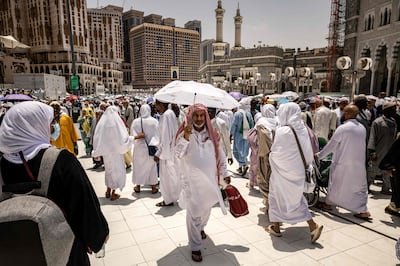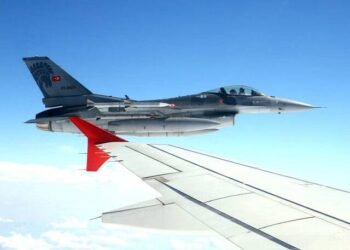Live updates: Follow the latest on Israel-Gaza
“I could not believe my eyes when I saw the minarets of the Sacred Mosque. I escaped death a thousand times,” Aouni Abdul Hamid tells media as he arrives in Makkah for the annual Hajj pilgrimage, months after escaping Gaza where he lost his entire family in the war.
Mr Abdul Hamid was an ambulance driver with the Palestinian Ministry of Health and spent the first 60 days of the war transporting the injured, listening to their cries of agony, treating their wounds and trying to alleviate their pain.
“I have transported hundreds of wounded people, but I could not drive my own children and family to the hospital. I reached my home after it was bombed only to find it in ruins. My entire family was martyred,” he said.
He is one of a group of 1,000 family members of Palestinians who were killed or wounded in Gaza invited to Saudi Arabia by King Salman to perform the Hajj this year.
Under the initiative, 2,000 pilgrims will arrive from Palestine.
Hundreds of thousands of Muslims have flocked to Makkah for the Hajj pilgrimage, this year taking place in the shadow of the Gaza war.

One of the world’s largest annual religious gatherings officially begins on Friday, and Saudi officials are trying to keep the focus on prayers.
Saudi Minister of Hajj and Umrah Tawfiq Al Rabiah warned last week that “no political activity” will be tolerated.
The bloodiest ever Gaza war broke out after Hamas’s October 7 attack resulted in the deaths of about 1,200 people, mostly civilians, according to Israeli official figures.
The Israeli army then launched a devastating offensive on the Gaza Strip that has killed more than 37,200 Palestinians, the majority of them civilians, according to the Health Ministry in Gaza.
After reaching his hotel in the Ray Bakhsh neighbourhood, which overlooks the Sacred Mosque, Mr Abdul Hamid said he could not believe his eyes when he saw the minarets.
“After my house was bombed and my entire family was martyred, I was arrested and imprisoned for three months. Because of the torture I endured, they had to amputate three of my toes,” he said.
“With God’s help, I was released from prison, and I underwent two operations on my foot. Today, I thank God for giving me the opportunity to perform this pilgrimage journey to his sacred house,” he said.
Abdullah Hassan walked tall and proud towards the hotel accommodating the pilgrims from Gaza. The war took away both his parents, his older brother, three of his children, his two sisters, and all of his nieces and nephews.
“We thank the leadership and the people of Saudi Arabia for this generous initiative to alleviate our suffering by inviting us on this pilgrimage journey. Perhaps this will help us find some solace,” he said.
Also among the pilgrims is Harbi Al Suwaikiri, who was circling the hotel lobby in his wheelchair, his face radiating with joy.
“I spent 10 years in prison. They had sentenced me to 800 years of imprisonment because I am a general in the Palestinian Authority. I never imagined I would be here in the holy city of Makkah, wearing the Ihram garment to perform Hajj,” he said.
“But God is all-powerful. I was released during the recent crisis, but I was the victim of a bombing, and my leg was amputated from the knee down. But my suffering was relieved when I was invited by the Custodian of the Two Holy Mosques to perform Hajj in Makkah.
“All my pains have subsided, and I will return to Gaza with more determination and resolve because everything is possible when one has hope.”








 United Arab Emirates Dirham Exchange Rate
United Arab Emirates Dirham Exchange Rate
